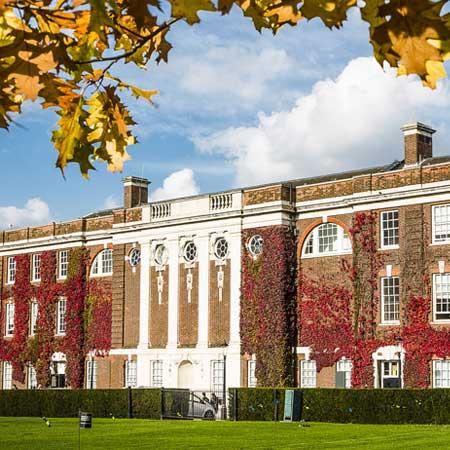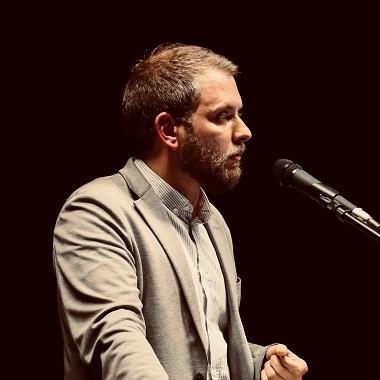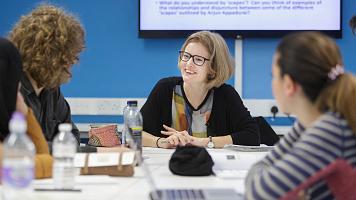MA
Ecology, Culture & Society
Content navigation menu
Why study MA Ecology, Culture & Society at Goldsmiths
Runaway climate change, mass extinctions, radical ecological transformations. We are living through profoundly unsettling times, and face equally uncertain futures. The MA Ecology, Culture & Society offers the opportunity to engage with the urgency of contemporary socio-ecological challenges and to imaginatively explore ways of inhabiting the Earth otherwise.
- The MA will take a distinctively interdisciplinary and critical perspective. It will highlight the concept of 'ecology' in an expanded sense and encompass the complex web of interconnections that bind people, animals, bodies, soils, ideas, technologies, practices, institutions, cultures, and histories with their changing environments.
- Drawing on perspectives from the humanities and the social sciences, the programme explores the many shifting relationships between natures and cultures around the world. It introduces critical new approaches to the connections between humans and animals in more-than-human worlds, and it will enable you to develop a critical understanding of the ways in which ecological issues are intertwined with the question of social justice, cultural difference, and decolonisation.
- You will be encouraged to explore the philosophical, cultural, political, and social dimensions that shape our understanding of contemporary socio-ecological issues and to explore imaginative responses to them. You will also learn to develop and apply ecological perspectives on various forms of social, political, and cultural analysis.
Contact the department
If you have specific questions about the degree, contact Martin Savransky.
Length
1 year full-time or 2 years part-time
Fees
Home - full-time: £10350
Home - part-time: £5175
International - full-time: £20460
Department
Link ecology with social, cultural and political processes
This programme will give you a critical understanding of our times and will help you develop key interdisciplinary skills for critical socio-ecological scholarship, creativity, communication, and activism. It will equip you with the insights, concepts, and skills needed to understand and engage with the tangled relationships between nature and culture, and the ethics and politics of our relationships with animals. You will also acquire knowledge and understanding of key concepts such as Anthropocene, anthropocentrism, value, difference, domestication, human exceptionalism, extractivism, decolonisation, radical pluralism, and the arts of living.
Expand your practical skills
In addition to lectures and seminars, you will learn to conduct independent research and will participate in experimental and practical forms of learning by conducting observations and developing practical experiments of your own design. You will also have the option of doing a placement with an NGO, grassroots activist network, or other relevant organisations, in order to develop your practical skills and reflect upon socio-ecological and animal practices.
The Masters will also allow you to benefit from its location in a global city, home to major cultural, scientific, artistic, and political institutions, movements and NGOs that play world-leading roles in furthering ecological knowledge, thought, and practice.
Study with the experts
Teaching on the MA Ecology, Culture & Society draws on Goldsmiths’ strengths and leadership on environmental issues, including our Green New Deal, to have a transformative effect on your understanding of (and critical engagement with) the most pressing socio-ecological issues of our time. It will build on existing Sociology staff's expertise on philosophy, animal studies, environmental humanities, science and technology studies, social and cultural theory, radical pluralism, postcolonial studies, aesthetics, and more-than-human politics.
The MA is ideal for anyone pursuing careers in policy research, NGOs, advocacy, charities, international organisations, cultural and political activism, global media, art and curating, as well as for further academic work leading to a PhD.
You'll learn in our world-leading Department of Sociology – ranked top 10 in the UK by QS World University Rankings 2023.
What you'll study
You'll study the following compulsory modules:
| Module title | Credits |
|---|---|
| Social Theory for Changing Climates | 30 credits |
| The Ethics and Politics of Animals | 30 credits |
| Cultural Ecologies | 30 credits |
How you'll be assessed
You’ll be assessed by a variety of methods, depending on your module choices. These may include essays, observations, reflexive diaries, and your dissrtation.
What our students say

Careers
This programme is ideal for anyone pursuing careers in policy research, NGOs, advocacy, charities, international organisations, cultural and political activism, global media, as well as for further academic work leading to a PhD.
Students are encouraged to seek work experience and work placements during the programme (such as through the optional module Practical Ecologies) as time allows.
The MA also allows you to pursue further academic research in one or more of the areas covered on the programme.
Monk
Monk is a Research Fellow in the Sociology Department. Monk is a black Labrador. He has accompanied Mariam Motamedi-Fraser to Goldsmiths since September 2015, when he was seven months old. He comes to staff and student meetings, and to the lectures and seminars that Mariam teaches.
Fees and funding
Annual tuition fees
These are the PG fees for students starting their programme in the 2024/2025 academic year.
- Home - full-time: £10350
- Home - part-time: £5175
- International - full-time: £20460
If your fees are not listed here, please check our postgraduate fees guidance or contact the Fees Office, who can also advise you about how to pay your fees.
It’s not currently possible for international students to study part-time under a student visa. If you think you might be eligible to study part-time while being on another visa type, please contact our Admissions Team for more information.
If you are looking to pay your fees please see our guide to making a payment.
Funding opportunities
Explore the Goldsmiths scholarships finder to find out what funding you may be eligible for.
If you are a UK student you may be eligible for a postgraduate loan.
Meanwhile our Careers Service can also offer advice on finding work during your studies.
Paying your fees
Find out about paying your tuition fees.
Additional costs
In addition to your tuition fees, you'll be responsible for any additional costs associated with your course, such as buying stationery and paying for photocopying. You can find out more about what you need to budget for on our study costs page.
There may also be specific additional costs associated with your programme. This can include things like paying for field trips or specialist materials for your assignments. Please check the programme specification for more information.
Entry requirements
You should have (or expect to be awarded) an undergraduate degree of at least upper second class standard in a relevant/related subject.
You might also be considered for some programmes if you aren’t a graduate or your degree is in an unrelated field, but have relevant experience and can show that you have the ability to work at postgraduate level. In such cases you will be interviewed for admission.
International qualifications
We accept a wide range of international qualifications. Find out more about the qualifications we accept from around the world.
If English isn’t your first language, you will need an IELTS score (or equivalent English language qualification) of 6.5 with a 6.5 in writing and no element lower than 6.0 to study this programme. If you need assistance with your English language, we offer a range of courses that can help prepare you for postgraduate study.
How to apply
You apply directly to Goldsmiths using our online application system.
To complete your application, you will need to have:
- Details of your academic qualifications
- The email address of your referee who we can request a reference from, or alternatively a copy of your academic reference
- Copies of your educational transcripts or certificates
- A personal statement
You'll be able to save your progress at any point and return to your application by logging in using your username/email and password.
Read our guide to applying for a postgraduate degree at Goldsmiths.







